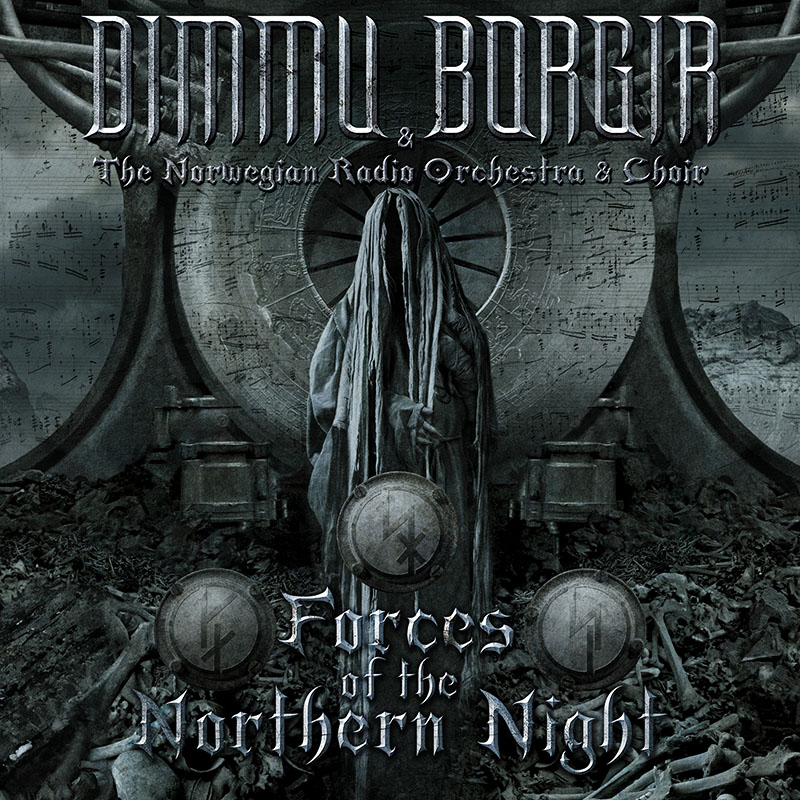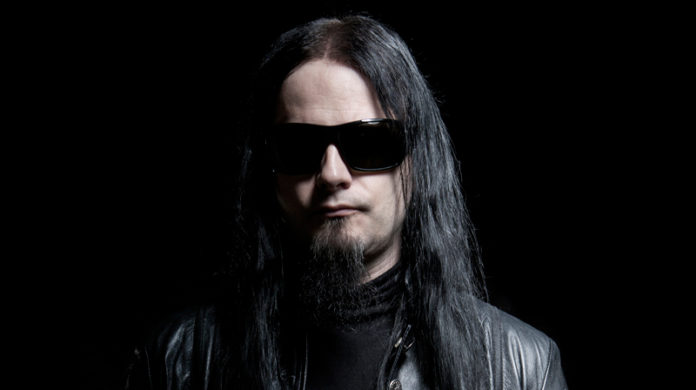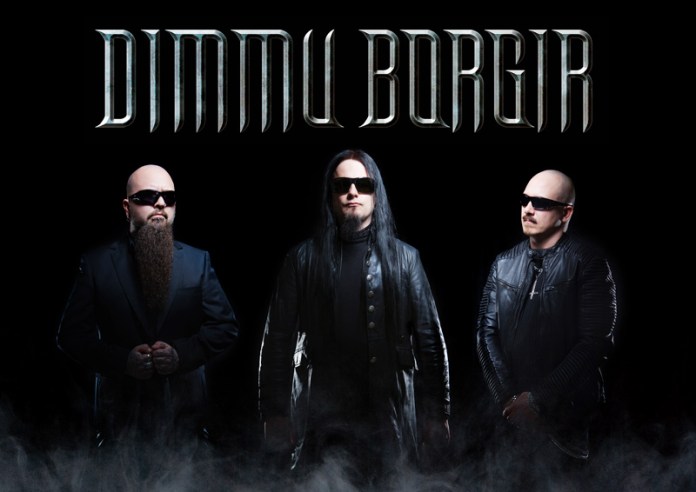Dimmu Borgir are one of those bands that don’t allow for fence-sitters. People either love them with a passion or have a visceral hatred towards them. Seen by some as trend-setters, others see them as posers, betrayers of what black metal “is supposed to be.”
Regardless of your opinions about them are, there is no doubt that Dimmu Borgir are a name to reckon with in heavy metal. By many accounts, they put black metal in the map, allowing it to reach a much wider audience than it had in years before. For some, that is blasphemy; for Dimmy Borgir, it’s business as usual. At least that’s what Shagrath, the singer and founder of the band, has to say about it.
Metal Blast: Considering that your last album, Abrahadabra, was released back in 2010, a lot of people are wondering whether the next one is just becoming like Chinese Democracy for Guns n’ Roses: An album trapped in development hell for years. Thankfully, I’ve read some interviews with Silenoz explaining that the new album is coming along. What are the latest developments about this very anticipated release?
Shagrath: I completely understand that people, from outside, see it like this. The last album was almost 7 years ago, but we have not been lazy; a lot of things have been happening behind the scenes. The last two years we’ve been focusing on this new record. We just completed it, we are very happy with it, and we hope to get it out there in the fall; we also want to do a world tour in 2018, so there are a lot of things happening.
Things take time and although I know that it’s been almost 7 years, well, we’ve toured the world since then! We did a lot of stuff!
MB: Well, I think that anybody who is paying attention to Dimmu Borgir knows that you’re not exactly just sitting at home doing nothing while waiting for the next album to magically appear. You’re an extremely active band, something that is quite evident if we look at your new live album, Forces of the Northern Night.
S: Yeah, these two shows [which appear in the new album] are a good way of summing it up. If you read the credits list for this release you can see just how many people were involved! All the arrangements and all the time that it takes to create something like this. At the same time, we also have families and kids, so we have other things to focus on as well. As a band we’ve never been like hamsters in a wheel, just releasing albums every year. We want to be a more exclusive band, so we put 100% into what we do. When we release something we want it to be something that we’re very proud of. MB: In one of the interviews that I read with Silenoz he mentioned that one of the things that have maybe slowed things down is that you paid attention to the sound in a different way, trying to make it a bit more raw, a bit less digital perhaps. Is that something you share as well?
MB: In one of the interviews that I read with Silenoz he mentioned that one of the things that have maybe slowed things down is that you paid attention to the sound in a different way, trying to make it a bit more raw, a bit less digital perhaps. Is that something you share as well?
S: Absolutely. We have matured over the years, and we’ve done all the records where we have triggers on the drums, and that’s not something that we necessarily think is so great nowadays.
We’re doing all the pre-production for the record in my own studio; we wanted to have a more organic, analog kind of sound, and we also wanted to put a real effort into making the song structures and arrangements really good. Now that we completed the new record, this is something we’re really proud of. It’s not rushed, it comes naturally.
You can’t force someone to be creative. This goes for all types of art forms, whether you’re a writer, a painter, a musician, or any kind of artist, you can’t just sit down and be creative, it needs to come naturally and be authentic. Dimmu Borgir‘s music is very complex and sophisticated; it’s made of many layers , and they take time. Now that we’re older, and a bit wiser, maybe we do things a little bit different from how we did them before. We’ll do whatever feel rights for us.
MB: It’s interesting that you mention the complexity of Dimmu Borgir, because that’s precisely one of the things that have always marked the band. In particular, the grandiosity of the music and the overlapping layers, one of them being the symphonic elements that, in the end, have always given a very epic and atmospheric character to the music. This is really evident in Forces of the Northern Night, and it’s great to see that the band is now able to show that dynamic with the Norwegian Radio Orchestra in Oslo, and the National Czech Symphonic Orchestra in the case of Wacken. Presenting it all to a wide audience, so that they can see exactly how big and grandiose the whole thing is… How did something like this come to be? Putting together something like this cannot be easy!
S: It’s not easy by any means; it takes a lot of time and preparation. You can see it in the credits list of these two shows. There are a lot of people involved.
In the case of the Wacken show, you can only imagine what it’s like when you have over 100 people on stage, and you only have 35 minutes change-over from the previous band. A lot of things can go wrong! [laughs]
MB: Right! You can’t even do a soundcheck like you can do in an indoor venue. You just hope for the best and try to kick ass.
S: Exactly, but we’re very fortunate to work with a very professional team. The people at the orchestra really know what they’re doing and it was very well organized. Of course, there is a difference between the Oslo show and the Wacken show, because in the Oslo show we had more time to prepare and it was indoors. You face a lot of challenges when you do an outdoor festival with a 35-minute changeover. The wind, for example, can take away the sound, so you have to make sure that everything works. The Wacken show is a bit more of a punk-rock performance, but I think that we still made it quite succesful.
MB: Absolutely. Having seen the show in this DVD, I think that it came out great… especially when you consider how little time you actually have to get ready for something like this!
S: Exactly! You’re facing a lot of challenges.
MB: The Oslo show was also great because it was obvious that some people in the Norwegian Radio Orchestra were really into Dimmu Borgir. In fact, I heard that the way in which that collaboration happened was due to the idea of some of the musicians from that orchestra.
S: Yeah, the initiative was by done one person from the orchestra, Thomas Røisland, and a guy who works at the NRK TV station in Norway, Olav Viksmo Slettan. They were the ones who brought the idea to the table after we had recorded and worked with the orchestra in the Abrahadabra album. We wanted to have a sitdown and come up with a way to make this a live show. We made it happen, after a lot of timing and planning. We’re extremely proud to not only have performed these two shows, but also to be able to share these concerts with the people who were not able to attend. It’s worth checking them out, even if you’re not a fan of the band it can still be interesting for you.
MB: I think it’s also great because Dimmu Borgir’s style lends itself to this, since it has a very operatic feel to it. Even people who may not have an interest in heavy metal or black metal can absolutely get something out of something like this, both because it’s a great show, but also to see the way in which the layers of a metal band of a symphonic orchestra can seamlessly combine.
S: Different types of people are able to find something to like in this music. Of course, this genre of music is very complex so, just like with opera, you kind of have to train your ear to understand it. Some people can perceive it as pure chaos, but I would say that it’s organized chaos [laughs]
MB: Like most people my age, I started listening metal with bands like Iron Maiden and Metallica, and back then listening to harder stuff with growling vocals, like Mayhem or Burzum, for example, just sounded like noise. It really takes a while before you’re able to understand the nuances in the sound. Of course, it always ends up being a matter of taste but, regardless, even if it doesn’t work at first, if you give this heavy stuff a shot, it can really work for you, and it’s fascinating to see that evolution even within yourself.
S: Totally, I agree with you there, that’s how it is. It’s also very complicated, but once you understand it you discover a whole new world. It’s cool.
MB: You know, this type of issue of mixing genres and styles, bringing in less traditional things for black metal really highlights another issue in this Dimmu Borgir’s history, which is that you’ve always been a pretty divisive band. In what some might see as just jealousy, your popularity is sometimes seen as negative for black metal purists. There’s a certain raw aspect to black metal music that, I think, some people don’t want to see as popular entertainment for the masses. Although as an adult you obviously look at things differently, you were once a kid who perhaps looked at the likes of Mayhem, Burzum or Darkthrone and wanted to also be different, and dark, and raw and rebellious… Although I get it if you don’t agree with the critics, do you understand where they’re coming from?
S: Well, the thing that people don’t realize is that we haven’t gotten anything for free. We’ve been a hardworking band since day one. Success comes with hard work and dedication. We never had a plan B with Dimmu Borgir, it was always all or nothing. That’s why we succeeded; because we were structured and disciplined, since the first gig we did in Germany, back in 1995. There have been no shortcuts to success. you have to tour the world and be dedicated to what you do. I see a lot of people throwing shit at Dimmu Borgir because of our success, but it is what it is. I don’t waste my time and think so much about what people think about us. Everyone is entitled to have an opinion… but if you comment on something, do some groundwork before you comment. Otherwise it doesn’t mean anything. Sometimes I have to laugh at a lot of the negative criticism thrown at Dimmu Borgir. I’ve been in the scene for almost 30 years, so it’s funny to see some people’s comments. They can think whatever they like; either way is fine for me.
MB: Black metal has always been fascinating for me because there are those who see a big ideological aspect to it, and which requires it to always be underground. If it it becomes popular, it’s no longer black metal.
S: Yeah, we have always been rebels within the underground, because we refused to follow any rules or respect any boundaries. We do what we want to do, and we’ve never paid attention to any rules about that. We respect the underground scene, we feel that we’re a part of it, we come from the underground scene, but Dimmu Borgir has always chosen to take a different path.
MB: I think people sometimes forget that this is a job, in the sense that even though it’s an artistic outlet for you, it’s also how you make a living.
S: Usually, when you have unknown underground bands that talk shit about the more successful bands, they’re usually people who have day jobs and who play music as a hobby. I have it as a lifestyle. I dedicate 100% of my time to Dimmu Borgir and what’s more “true” than that?
MB: When you started, you didn’t have a fallback position? It was this or nothing?
S: For me and Silenoz, it was either doing it completely or not doing it. There is no middle way, there is no plan b. There are no side-jobs. There is 100% focus on Dimmu Borgir, and it’s been like that for 25 years now. We put our sweat, tears and blood into this band. It’s pure dedication, and that’s what it takes to be successful. You have to have that focus.
MB: I think that your career and your shows demonstrates that. The effort and the dedication.
S: And also the dedication to our fans. Today I woke up with the news that we have entered the charts in nº1 position in Germany, Austria, Finland and Sweden with “Forces of the Northern Night.” It shows that we still have dedicated fans and that people care about Dimmu Borgir even if we haven’t released an album for many years. That’s a big part of what keeps us going.
MB: Congratulations on those great news!
S: Yeah, it’s great, and I really think that it’s cool. There is a lot of hard work put into Dimmu Borgir. It’s 24/7, non-stop.
MB: Shagrath, I really appreciate that you took the time to do this today. I know that you have other interviews lined up today, so I’m just looking forward to seeing you on tour … soon, I hope!
S: The world tour should start in early 2018, if everything goes as planned. We’ll be back in America around March or April. European tour first, and then US after that.


